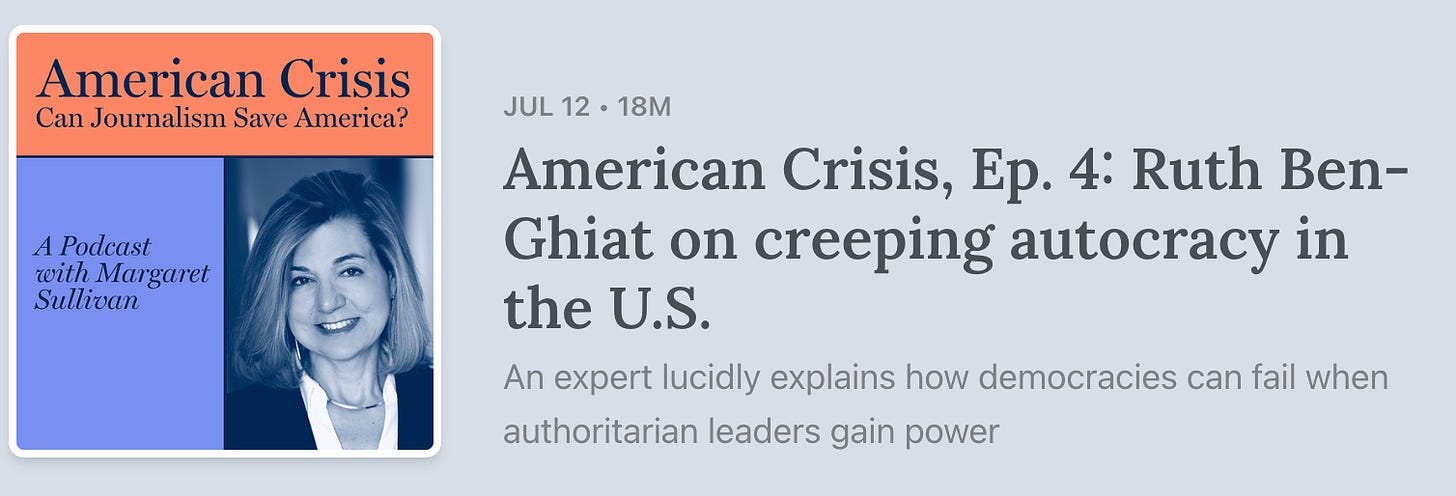Can Journalism Save Democracy? My conversation with Margaret Sullivan
No to internalizing right-wing attacks and trying to court those who attack you. Yes to standing up for truth, freedom of the press, and exposing authoritarian corruption and conspiracy theories.
Welcome back to Lucid, and hello to all new subscribers. Yesterday’s Q&A was so stimulating. We talked about the climate emergency, Turkish leader Erdogan’s manipulations regarding Sweden’s approval to join NATO, and how to be prepared to go on the offensive to protect democracy (rather than being in denial and thus on the defensive when things happen). And we heard encouraging news about California parents and students pushing back against a school board dominated by far-right forces. If you’d like to join these gatherings, you can become a paying subscriber here:
_____________________
With our democratic emergency deepening in the US, the role the media plays in covering threats to our freedoms and exposing the scams and corruption of authoritarians is more vital than ever. That’s where Margaret Sullivan, the former New York Times public editor and former media columnist for the Washington Post, comes in. Margaret is such an important voice for addressing strengths and failings of the media in conveying the information citizens need to be informed and take action.
Margaret now writes a weekly column for the Guardian US, teaches at Duke University, and has a new Substack newsletter entitled American Crisis. It asks: Can Journalism Save Democracy? She interviewed me for her Substack’s podcast, and I’m very happy to share our conversation with you. “I have tremendous respect for Ben-Ghiat’s scholarship and her superb ability to educate journalists and citizens about the dangers of these autocratic figures. She’s also a lot of fun to talk to.” The feeling is mutual!
The podcast is paywalled but a long preview is accessible by clicking this link.
Also on this theme, here is my Nov. 2022 essay inspired by my participation in Nikole Hannah-Jones’s Journalism and Democracy conference held at Howard University. What happens to “mainstream media” when the center shifts to the right and one party in a bipartisan system turns autocratic?
"The times demand that we liberate ourselves from the old conventions about journalism,” Professor Hannah-Jones declared in her introduction to the conference. “We must understand that when it comes to democracy and equality, neutrality is an abdication of our duty." Her words are even more relevant today.





The answer to the question is no. Our mainstream political media played a very large part in bringing us to this point, so expecting them to rescue democracy is a fantasy. Ms. Sullivan is a terrific critical voice but she's in a miniscule minority within the journalistic community. I think part of the problem we on the left have is our inability to let go of our acceptance of the self-mythology of the MSM. Personally, I believe in 50 or 100 years, political journalism going back 4 or 5 decades is more likely to be studied in social psychology classes than it will in whatever journalism school evolves into.
More on the importance of journalism as I wrote in my Substack Notes recently on the Climate Crisis.....
May is generally the start of wildfire season in Canada each year and the “Union of Concerned Scientists” (ucsusd.org) just made a straightforward and quantifiable association between increases in wildfires and carbon emissions fossil fuel use. They established the Carbon Major Report and it exposed that there are 88 companies that are responsible for the carbon emissions that are caught in the atmosphere today and are literally suffocating and choking the earth to death! This smothering is causing dramatic increases and consequences in wildfires, heat domes, and floods within countries.
The “Carbon Majors” is often the overall grouping name for the producers of Big Oil, Coal, and Gas investor-owned companies such as Shell, BP, Exxon, Chevron and BHP. The recently established Carbon Majors Report has found that 88 Oil, Coal, and Gas producers were responsible for 63 percent of all carbon emissions worldwide. This 2013 report was jointly commissioned by the Climate Justice Program and Greenpeace, and the findings were published in a journal article written by Richard Heede in “Climatic Change.” Most of world at that time -- 2013 -- discovered who is historically responsible for climate change, and the published research indicated that ChevronTexaco Corporation was the leading producer of 3.5 percent of all carbon emissions. Exxon was slightly behind at 3.2 percent, then BP at 2.5 percent. Then in 2017, the “Climate Accountability Institute” (CAI) updated the Carbon Majors Report and found that 3 years later, 100 Oil, Coal, and Gas producers were responsible for 71 percent of carbon emissions!
Since the release of the 2013 Carbon Majors Report, climate change litigation has been pursued with attempts to connect carbon emissions effects within the climate crisis within the court system throughout the world and in the US. These companies knew what fossil fuels were ultimately doing to our environment and what their continued use would increasingly do to our future, and they knowingly:
1. denied the effects of carbon emissions.
2. delayed the formulation of climate change policies.
3. spent half a billion dollars per year working against climate change policy.
4. slowed the switch to cleaner, safer electricity systems.
5. slowed the progress of substitute home heating systems.
While climate change disasters are increasing at harrowing rates and negatively affecting the most fundamental of human rights – such as the right to life, health, food security, water, and sanitation – real action to limit these devastating effects has been extremely slow in coming. Instead of addressing the main cause of climate change by curbing carbon emissions from the production and consumption of fossil fuels, the Carbon Majors continue to be largely unregulated in their activities and their human rights responsibilities under international law.